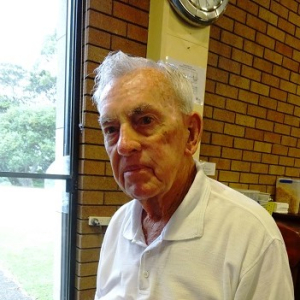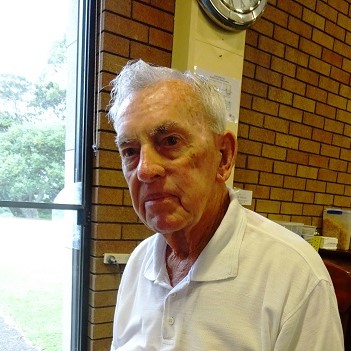Peter MALONE
Riefenstahl
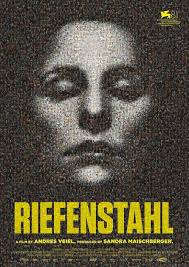
RIEFENSTAHL
Germany, 2024, 115 minutes, Colour.
Directed by Andres Veiel.
Audiences interested in the German film industry but, especially for those who respond to the name of the 1930s director, Leni Riefenstahl, this documentary, Riefenstahl, is a significant documentary. She became famous in the mid 1930s as a propagandist for the Third Reich, association with Hitler, filming the vast Nuremberg rally of 1934, Triumph of the Will, as well as her filming of the Berlin Olympiad, 1936.
The documentary is filled with excerpts from her films, comments about her technique, camera placement, the vastness of the sets filled with Nazi enthusiasts, troops, her sitting in the editing box and defining the look and tone of her films. Evident is the awareness of racial superiority in the focusing on the Aryan German people, the superior bodies of the athletes at the Olympics (including US African-American Jesse Owens). Riefenstahl provides significant resources for appreciating these films.
However, there is also the issue of her Nazi sympathies, relationship with Goebbels, Hitler, the production of her films, the screenings, the repercussions. Riefenstahl in fact, born 1902, died in 2001, almost 70 years after her films, often embroiled in discussions, arguments about her political affiliations, sympathies, this film drawing on documentaries about her, quite a number of excerpts from television interviews, harsh questions, condemnations, her self-defence.
While there is a lot of documentation from the 1930s and 1940s, including clips from her famous mountain climbing film features, singing her with Goebbels, with Hitler, her being part of the National’s response to national Socialism at the time, there is a great deal of excerpts from previous documentaries as well as television interviews, especially by the 1970s and onwards, her being interrogated about her Nazi sympathies. There is some ambiguity in the attitude of the director, presenting all this material, but seemingly slanting it, according to some viewers, to a condemnation of Riefenstahl.
There are also sections of this documentary on her visits to Africa, her photography, her publications, her anthropological interests – especially in comparison with or contrast to her earlier films and support of Hitler.
Not the last word in judgement on Leni Riefenstahl but certainly a contribution to appreciating her skills in filmmaking and the questions of her perspectives in the 1930s and 1940s.
Hysteria/ Germany
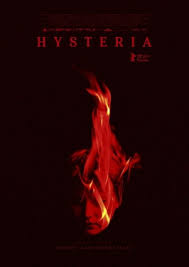
HYSTERIA
Germany, 2025, 104 minutes, Colour.
Devrim Lingnau, Mehdi Meskar, Serkan Kaya, Nicolette Krebitz, Aziz Capkurt, Nazmi Kirik.
Directed by Mehmet Akif Büyükatalay.
Hysteria is a different kind of thriller, the making of a film in the 21st-century by a group interested in migration issues, Muslims coming to Germany. Audiences might be tempted to become a bit hysterical as they watch the aftermath of a scene where a copy of the Quran is burnt, those involved becoming intense about what happened, responsibility, the director and producer, the focus on the young assistant, the actors who were amateurs coming from a local migrant centre, a taxi driver. Ultimately, each of the characters has their version of what happened, blame, and the audience having to decide, if they can, what really happened with each of the characters and who was responsible.
Many audiences will find this film difficult to sit through, the complexity of the characters, difficulties in the elaboration of the Muslim issues and the Quran, the stances of the participants, the ambiguity of all the perspectives.
But, in retrospect, audiences will have looked at and listen to the explanations, true and/or falls by all the participants and realise, with memories of film like Kurosawa’s Rashomon, that there can be many versions of the same story.
Misericorde/ Misericordia

MISERICORDE/ MISERICORDIA
France, 2024, 103 minutes, Colour.
Felix Kiysyl, Catherine Frot, Jean-Baptiste Durand, Sergei Richard, Jacques Develay, David Ayala.
Directed by Alain Guiraudie.
Misericordia has been described as an existential drama. As a useful description whether it be encouraging or off-putting. And, it is a French existential drama, remembering Descartes’s “I think, therefore I am”. As well as, “I feel, therefore I mm”.
Misericordia is the Latin word from Mercy, which also includes themes of kindness and forgiveness. In fact, this drama is set in a French village and a Catholic context, the iconography, a eulogy at a funeral questioning the nature of death, transition to a heavenly life of love, and the presence of a priest character throughout the film. At some moments, there is empathy for these religious themes, at other times, a critique of double standards in religious behaviour. And, in the middle of the film, a sequence not referred to in any of the main critiques, a very significant confession-reversal theme, a character standing in for the priest, the priest confessing as a penitent.
The significant point of reference for what happens in this village is the role of the central character, Jeremie, former baker, out of work, driving in the long opening sequence through the French countryside into the village, arriving for the funeral of a boss to whom he was devoted. The widow is very sympathetic. Her son, short-tempered, married with a child, has been alienated from Jeremie, his childhood friend.
Another point of reference. In the late 1960s, there were several films, including Paolo Pasolini’s Teorema, where a stranger enters the life of a family, seductive, changing each character.
There are some early intimations of the homoerotic atmosphere – and this certainly mergers throughout the film, fights between Jeremie and his alienated friend, physical and wrestling, Jeremie visiting another old friend, making an approach. The priest is also present much of the time, in the family home, and, especially, foraging in the important activity for the village, the search for and gathering of special mushrooms.
The screenplay stays with Jeremie throughout the film, initially enigmatic in his return, his decision to stay, trying to probe what is going on in his mind, in his emotions, the loner, the repressed gay man, his sometimes erratic behaviour, his violence, his lies, his rationalisations, the probing of the police and their investigations, continued support of the priest and the revelation of his own emotions.
Throughout the film the audience sees an alarm clock shining at various times during the night. And, sometimes, Jeremie cries out in his dreams, reliving the violence, imagining interrogation by the police in his room. Which means that the film should not be judged as “realistic”. Rather, it is something of a parable about a lonely man, wilful behaviour, acknowledging truth, experiencing some kind of Misericordia.
As has been said, this film is very French in tone. It might be something of a different experience were there to be an overtly emotional version from Italy or, by contrast, a sombre version from the Scandinavian countries. A film designed for thoughtful and reflective audiences.
- The title, mercy, forgiveness? for Jeremie? For the other characters?
- The French settings, the long prologue during the credits, the car journeying through the countryside, the mountains, the village, the streets, homes, the forests, the countryside? The musical score?
- The religious dimensions of the film, the nature of Misericordia, the funeral for the deceased baker, the role of the parish priest, his words, his actions, his sexual orientation and behaviour, the reverse confessional sequence, his confessing to Jeremie, with the concealment? Jeremie, in himself, sexual drive, violence, the killing of the cover-up? The need for Misericordia?
- Jeremie’s story, in the village, baker, his relationship with the dead man, travelling for the funeral, meeting Martine, staying with her, meeting Vincent, memories of the past of their friendship, the alienation? His delay, staying in the village, the visit to Walter, the sexual approach, the visiting again, their discussions? The hostility of Vincent, his wife and family, the final confrontation with Vincent, killing him, burying the body? Jeremie as an actor, the various scenarios, the lies?
- Martine, her relationship with her husband, welcoming Jeremie, Vincent suspicious that he was wanting to have a relationship with his mother? Her character, support, her family, the ambiguities of Jeremie’s behaviour?
- Walter, alone, friendship with Vincent, memories of Jeremie, the visits, and his behaviour, the sexual issues?
- The parish priest, his character, visiting Martine, the funeral, the meals? His insight into Jeremie, Jeremie’s behaviour, his own attractions, the reverse confession, concealing Jeremie’s behaviour, the bargains with him, emotional? Saving Jeremie from the polics, the setup in the bedroom?
- The concern about Vincent’s disappearance, his wife, Martine, the arrival of the police, their interrogations and enquiries? The various hypotheses? The possible solutions? Jeremie and his answer for every issue, weaving, lying, changing details?
- The aftermath of this story, audience insight into Jeremie, as a person, his desires, sexual orientation, inherent violence, his violent behaviour cover-up? His future?
Mission Impossible: The Final Reckoning
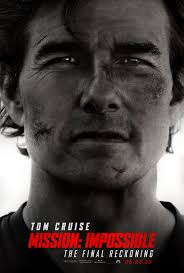
MISSION IMPOSSIBLE: THE FINAL RECKONING
US, 2025, 169 minutes, Colour.
Tom Cruise, Hayley Atwell, Simon Pegg, Ving Rhames, Esai Morales, Pom Klementieff, Henry Czerny, Holt McCallany, Janet McTeer, Nick Offerman, Hannah Waddingham, Trammell Tillman, Angela Bassett, Shea Whigham, Charles Parnell, Mark Gattis, Rolf Saxon, Cary Elwes.
Directed by Christopher McQuarrie.
The grand finale.
The spin-off from the very successful television series, with its pounding score and the messages disappearing after five seconds, the first Mission Impossible, the introduction to Tom Cruise as Ethan Hunt, was released in 1996. Cruise was 33. Now, 2025, the eighth film in the franchise, and here is Cruise in his early 60s, athletic, doing all his stunts, very serious saviour of the world.
There is something of a complex background to this finale, an AI development called The Entity and the danger of its overcoming the human race, and setting off a nuclear holocaust. Luther, Ving Rhames from the past films, is here developing a mechanism to counteract The Entity. But, arch-villain, Gabriel (Esai Morales) wants to conquer the world and has the other piece. The President of the US, Angela Bassett, surrounded by advisers (several British character actors, including Janet McTeer and Mark Gattis) is relying on Ethan Hunt to save the world.
There are various characters who have worked with Ethan in the past, especially Benji, Simon Pegg, and a reunion with Grace, Hayley Atwell. The first part of the film is setting the scene, Hunt building up his team (and some mask removing action scenes). In this film there are quite a number of references to the action in 1996, especially an angry character, Briggs (Shea Whigham) whose father was killed by Hunt (with some flashbacks from the original and Jon Voight). Briggs is working with Kittredge, Henry Czerny, Hunt’s sometime control. But, especially with killer, Pom Klementieff rescued from prison, the team is ready.
The second part of the film has Ethan Hunt underwater most of the time, and some extraordinary stunt work, as he dives into a sunken vessel in the Behring Sea, the difficulties of the depth, compression, breathing, an narrow tube which means that he has to strip down to his boxers! and survive and reach the surface. Ultimate success (but perhaps some realists in the audience wondering about meals, sleep, toilet stops! None of which are shown.)
The last part of the film is action adventure, stunts and CGI, making mission impossible, Mission Impossibler, in fact, Mission Impossiblest. And, with some instant travelling from Europe to Africa, beautiful mountain and valley African locations for the finale, especially with Hunt pursuing Gabriel in light planes, and some ultra-gymnastics as Hunt leaps, dangles, climbs on to Gabriel’s plane, overcomes him, takes the connection to destroy the Entity, tension with the time coming down to the splittest of seconds to save the world.
In the American presidential control room, enormous relief, then a final puzzling scene in Trafalgar Square, Ethan Hunt, each member of his team approaching him, looking knowingly, then turning away… And we wonder actually if he is dead and this is the final tribute to his world saving achievement from his team…
- Popular 30 year franchise? The television series (and the continued use of the musical theme)? The character of Ethan Hunt, saving the world? Tom Cruise, his presence, performance, stunts, hero-saviour?
- The development of the character of Ethan Hunt over the decades, this film using flashbacks to the original film, to past films? Tom Cruise at 30 something then 60 something?
- The locations, Washington and the President, the vast security headquarters? The Arctic, the Behring Sea, underwater photography, the long sequence exploring the submerged vessel, the transition to Africa, the beauty of the scenery, London, Trafalgar Square? The background musical score, sense of excitement, tension, amplified?
- The explanation of the basic situation about The Entity? Control of the human race? The nuclear danger? The role of Gabriel, wanting power? President of the US, her response, her advisers, the reliance on Ethan Hunt? Those dissenting? The short time to DEFCON, the focus on the clock?
- Re-introducing Ethan Hunt, his reputation, his achievements, Kittredge, the explanations of his achievement, dangers, deaths, the presence of Briggs, the flashbacks to his father and Hunt causing his death? Refusing to shake hands? Kittredge and Briggs working together, building up to a confrontation? Then a reconciliation?
- Luther, his presence in the previous films, technical skills, getting older, facing The Entity, the preparation of material for the capture of The Entity? His death? His final message after the achievement and exploding after five seconds? Seen in flashbacks?
- Benji and Grace, their characters, in the previous films? The team, Grace, pickpocketing, her skills and timing, the relationship with Ethan? Benji, technical skills? The recruiting of Paris, going to the prison, as guards, the masks, the shootout, Capt Bledsoe, the guns, the fight? Paris, her character, killer, speaking in French?
- The explanation of the strategy, the team possessing Luther’s capture, Gabriel, the confrontations, arrogant personality, his troops, the escape, his possessing the other part of the capture? The explanation of the timing, the split second timing?
- The background of locating the sunken vessel, the issue of the key, who had the keys? The compass points, the technology, the submarines, Hunt and the various ships, the explanation of the dangers, the cold, compression, revival? The captain of the ship, getting the information, the code? The Admiral supervisor, the collaboration?
- The team, going to St Matthew Island, the discovery of William Donloe, his wife, his presence 30 years earlier, his achievement on the island? The arrival of the Russians, the buildup to the fight, Don and his transmitting the code, his wife and Grace with the compressor for revival?
- The long sequence of Hunt underwater, the dangers, the depths, tunnel and his having to remove his clothes, going to the top, unconscious, the revival, Grace and Donloe’s wife?
- Washington, the dilemmas for the the president, the personalities of her team, the timing, her reliance on Hunt? Different advisers, the decision about bombing the American city, the advisers with the gun, his being shot, the general killed?
- The tension with Hunt, Gabriel’s arrival, confrontation, his men the shooting, Gabriel and the plane, Hunt in pursuit, the beautiful scenery, the range of highflying stunts, possible or impossible? The battle in the sky, overcoming Gabriel, getting the peace for controlling The Entity? Parachuting down?
- The fight, Benji wounded, Donloe and his collaboration, Benji giving the directions for the wires, Grace waiting to cut when the signal came through? Down to the final second? The achievement?
- The president, her decision, not to destroy the town city, the power going off, coming on again, the world saved, her going to inspect the troops, her son?
- The team, the achievement, Benji and his wound, care, Grace and Hunt?
- The final sequence, Trafalgar Square, the world saved – did Hunt survive or was this a symbolic death sequence, his meeting once again the significant people in his team?
- Mission Impoible: the Final Reckoning movie
- Christopher McQuarie
- Tom Cruise
- Hayley Attwell
- Janet McTeer
- Mark Gatiss
- Holt McCallany
- Hannah Waddingham
- Pom Klementieff
- Rolf Saxon
- Shea Wigham
- Henry Czerny
- Esai Morales
- Peter Malone's Movie Reviews
- Angela Bassett
- Charles Parnell
- Simon Pegg
- Ving Rhames
- Travis Tillman
RIP, Kevin Ehlefeldt MSC
RIP, Kevin Ehlefeldt MSC
Last night (Saturday, 24 May), we received news that Fr. Kevin Ehlefeldt MSC, passed away at 9.30 pm at Prince of Wales (POW) Hospital, Randwick, NSW.
From Tim Brennan MSC:
“After a number of days of slowly deteriorating at POW Hospital, he has gone to meet the Lord.
Two of his nieces have been by his bedside in recent days.
Mary and Pauline are both nurses, one living in Northern NSW and one in western Sydney.”
On 26 February 2025, Kevin marked 77 years of religious profession. He was an MSC brother for more than twenty years before discerning ordination and entering the late vocations seminary at Kensington in 1976. He was ordained to the priesthood on 18 August 1979.
As a brother, Kevin was appointed to a number of our communities, with time between Kensington and Croydon, and appointed to a number of our colleges. Following ordination, he ministered in the parishes of Randwick (NSW), Kings Meadow (TAS), Henley Beach (SA), Camp Hill (QLD), and later parish supply in the Lismore Diocese.
Kevin would have celebrated the 96th anniversary of his birth in August.
Kevin and his brother, John MSC.
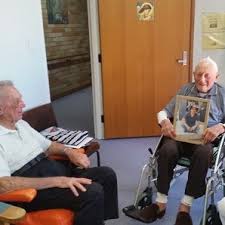
May Kevin rest with Christ in death and rise with him in glory.
Man About the House, A

A MAN ABOUT THE HOUSE
UK, 1947, 99 minutes, Black-and-white.
Margaret Johnston, Dulcie Gray, Kieron Moore, Guy Middleton, Felix Aylmer.
Directed by Lesley Arliss.
A rather low-key melodrama based on a popular novel of the time by Francis Brett Young. This was the period in British cinema of Great Expectations, Black Narcissus. But there were also quite a number of colourful melodramas, sometimes based in Italy as was this one.
Two unmarried sisters run a school in London but receive a bequest from an uncle, a substantial income each year as well as a home in Italy, outside Naples. The sisters are played by Margaret Johnston (Australian-born, stage actress, in films from the 40s to 1968) and Dulcie Gray, with a long career in films. Introduced here is the Irish actor Kieron Moore, retiring from films in 1974, notable for his performances from Vronski with Vivien Leigh in the 1948 Anna Karenina. Guy Middleton and Felix Aylmer were regulars in many British films and these decades.
The film opens in a rather prim London, transfers to Italy, the older sister being very reserved and arrogant, the younger sister more enthusiastic. They encounter Salvatore, the manager of the estate. The older sister gradually mellows and falls in love, the younger sister observing but then falling in love with a doctor who visits. Salvatore is the life of the community, but the audience will at some stage begin to be suspicious, this confirmed, as he is poisoning his wife, resentful that his family which owned the estate has been taken over by the English.
A melodramatic and artificially staged fight between Salvatore and the doctor, the older sister recovering and never knowing her husband’s plans.
Certainly not to the taste and style of the 21st-century audience. Rather, more interesting as an example of British filmmaking in the postwar period.
Cassino in Ischia
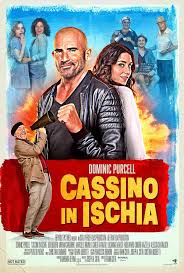
CASSINO IN ISCHIA
US, 2024, 115 minutes, Colour.
Dominic Purcell, Yvonne Scio, Jennifer Mischiati, Carlotta Natolie, Ugo Dighero..
Directed by Frank Ciota.
Response to this colourful visit to Italy, especially the beauties of Ischia, will certainly depend on the mood of the viewer. For those in a relaxed mood, there is a mixture of holiday, romance, some Italian farce situations and characters, but also some more serious themes. Those who prefer serious themes will have to live with the broad Italian comedy and focus on an action actor who is 53, not winning the awards that he used to, long alienated from his brother, running out of options for his career, and visiting Italy to reflect on his life.
There is also an appeal to cinema buffs, memories of Lucchino Visconti, whom the action actor had never heard of, some discussions about his films, some clips from Rocco and his Brothers, the finding of an unfinished manuscript in Visconti’s house, and a hack Italian director seeing it as his opportunity to make a comeback after a dismal response to one of his films at a film festival. He is supported by his wife and his daughter who wants to be an actress (and, after appearing in the film, decides not to be).
Dominic Purcell, born in England but growing up in Australia and appearing first in Australian film and television, then settling in the US and the continuous career of action films and television, is tough-looking, tough-sounding, but goes through a process whereby has to look into himself, his broken marriage, the alienation from his brother, what he is to do after the age of 50. We see some filming of scenes, the scenario being Proust’s Memories of Time Lost, black-and-white photography, nods to Visconti, and the central character carrying his suitcase symbolic of his carrying his memories.
The Italian director, his family and entourage provide all the farcical situations. A local tour guide, glamorous, provides the potential for a romance. And, a Hollywood opportunity for the actor to revive his career, provides an opportunity for self reflection again, and the reconciliation with his brother (whom he promotes to assistant director for the finishing of the new Visconti -like film).
Dialogue is a mixture of the farcical and the serious, giving Dominic Purcell opportunities to be dramatic at times, several times weeping. But, the Italians move from English to Italian at the drop of a cue.
Many will enjoy it. Some will look down on it. But it is something of a mixumgatherum, well expressed by Zeoisme, October 2024, IMDb:
The main problem is that the Euro-Italian acting style doesn't translate into an American English language movie. All the stock Italian tropes were mostly redundant in this hybrid. Mamas, food, mistaken identities, comedy of errors, buffoons, bureaucratic over-reach and frequent weeping just didn't gel with the fairly decent basic story.
Oh...Rosalinda!
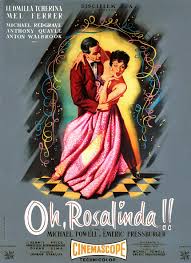
OH… ROSALINDA!
UK, 1955, 101 minutes, Colour.
Anton Walbrook, Michael Redgrave, Ludmila Tcherina, Anthony Quayle, Dennis Price, Mel Ferrer, Anneliese Rothenberger.
Directed by Michael Powell.
Film-buffs will appreciate the films of Michael Powell and Emeric Pressburger, especially admiring their very successful and striking films of the 1940s, will want to see this film, the last of their experiments, their coming to the end of their collaboration in the late 1950s.
The screenplay is an updating of Strauss’s Die Fledermaus, The Bat, set in 1899, a light operetta, romance, deceptions, the touches of farce.
However, this film will be something of an acquired taste. The basic plot and characters from the original have been transferred to 1955, post-war Vienna, divided, rather like Berlin, into various zones, Russian, British, American, French. Audiences who appreciate the Strauss music will enjoy it. Audiences who find this kind of operetta something of a strain, will definitely feel the strain.
But, the adaptation to Vienna 1955, the international implications of the time, friendships and hostilities, the role of the Soviet Union, British propriety, the Americans being American, and the French touches of a more, is persuasive.
The film is very stylised, staged, emphasis on elaborate decor, lavish costumes, more than a touch of the bedroom farce. But, it is the cast which is quite striking. Michael Redgrave, surprisingly, represents the French, a man about town, married to Rosalinda, but always with an eye to other women, eventually being trapped. This is not the Michael Redgrave we are used to, doing his own singing, dancing, surprising high kicks, and into the air with the heel clicking zest. On the other hand, Dennis Price is typically British – enough said. Anthony Quayle is bombastic as the Russian representative. Mel Ferrer is the romantic American.
Entering the proceedings, introducing them, manipulating events, tantalising characters is the host, played by Anton Walbrook, veteran of several Powell-Pressburger films, The 49th Parallel, Colonel Blimp, The Red Shoes. He is obviously enjoying himself here.
Singer-dancer, Ludmila Tcherina is Rosalinda.
A specialised film for film buffs, Strauss lovers, those who enjoy this kind of operetta farce.
Hurry Up Tomorrow
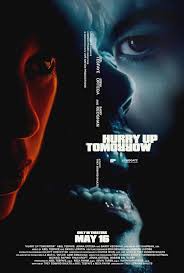
HURRY UP TOMORROW
US, 2025, 105 minutes, Colour.
Abel Tesfaye, Jenna Ortega, Barry Keoghan, Riley Keogh, Ash T, Paul L.Davis.
Directed byTrey Edward Shults,
The many fans of the very successful recording artist, The Weekend, actual name, Abel Tesfaye, have enthused on social media how much they like this film, quite a number giving it 10 out of 10.
For the many audiences who are not familiar with The Weekend, his career, his songs, his singing style, there is a curiosity value, but probably also some bewilderment.
The Weekend plays a variation on his own character, a successful singer on tour, many of his songs throughout the film, many with autobiographical touches. He is something of a sad, even morose, character in his manner and demeanour, manifesting this more and more as the film goes on, more depressed, lugubrious in his reactions, often moody, with violent touches.
A number of commentators have labelled this film as a vanity project, cowritten and produced by the singer himself, aligning the narrative with songs from his most recent album, definitely with a focus on himself. In fact, at the opening, he is gazing into the mirror, gazing at himself, preening, doing weightlifting near a mirror, then dressing for his going on stage, a long corridor processing towards the stage, the dramatic moment, his entry, the absolute acclaim.
But, he is conscious of losing his voice, tantrums, walking off, then a very powerful scene, in fact, with Irish actor, Barry Keoghan, playing his manager, drawing on a repertoire of persuasion to coax and force the singer to go back on stage.
In the meantime, there is what seems an unrelated episode, a young woman, Jenna Ortega (called Anima in the credits, a nod to the psychology of Carl Jung and the feminine aspect of a male?) angrily destroying a house and setting it alight and driving away. Then she is at the concert, rapt in the singer, his seeing her, her coming to him in his dressing room, then to the hotel, the night together, she something of a stalker, explaining her interpretation of his songs, and his mixed reaction.
How can this develop? Realistically? Symbolically? The stalker tying the singer up, overpowering him, the confrontation with the manager, fight, death… And how real is this?, Symbolic? Best explained by those enthusiastic fans who give the film 10 out of 10.
Final Destination: Bloodlines
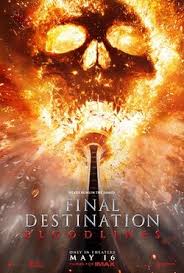
FINAL DESTINATION: BLOODLINES
US, 2025, 110 minutes, Colour.
Kaitlyn Santa Juana, Tio Briones, Rya Kihlstedt, Richard Harmon, Owen Patrick Joyner, Anna Lore, Alex Zahara, April Telek, Tony Todd, Brec Bassinger, Gabrielle Rose, Max Lloyd-Jones.
Directed by Zach Lipovsky and Adam B. Stein.
It is a quarter of a century since audiences enjoyed the first Final Destination film. Almost immediately there were two sequels. Later there were two more, the fourth being simply called the Final Destination. Here is a sixth entry which fans and critics have endorsed.
In the first film, someone had a premonition of disaster and the rest of the film saw the death episode , some characters escaping the disaster but eventually death catching up with them. And, this was the basic formula throughout all the films. And, here it is again. So the outline of the plot is not unexpected – the interest and enjoyment is to see how it is played out.
This film opens with an extraordinarily striking episode, a young couple, his intention to propose, their going to the opening of a very high tower restaurant, Skyview, lavish, overbooked, the young man and his girlfriend disappointed, but the proposal, her acknowledging that she is pregnant, her acceptance. A great deal of attention is given to the celebrations, a singer, her little son who will become important in the aftermath, but also an obnoxious young boy, mischief maker, with a coin and the warning for him to be careful. Which, of course, he is not, throwing the coin over the high balustrade – and the deathly consequences.
The special effects for the disaster and breaking up of the restaurant, the fatalities, the sense of danger, apprehension, fears, tragedies, are especially striking. The audience is so caught up in the overwhelming experience that they may have forgotten that this is obviously just a premonition.
That was 50 years ago. Now, the present, and it is a student at college, Stefani, who wakes up in the middle of a lecture screaming, the nightmare, and the repetitions every night, disturbing her roommate. She decides that she needs to go home, the sympathetic father, the younger brother who is disappointed that she has gone off and does not keep contact, the mother having left the family long since. When we discover that the mother is the young girl of the premonition, Iris, the drama gets going.
The dramatic ploy for the film is the presumption that Death pursues everyone, more especially those who have eluded when Iris was the one who saw the danger and warned so that everybody could be rescued. So, the tension of the film is rediscovering the mother, her 20 years’ seclusion, her investigations as to survivors, the weird Journal of sketches and death information, it now narrowing down to her and her family. Hence the title, Bloodlines.
So, for audiences who enjoy the characters, some likeable, some irritating, all pursued by Death, there is plenty of drama and excitement.
However, as with the previous films but especially now with so many horror films dramatising grisly and gory deaths, the deaths here are gruesome with many audiences wanting to shut their eyes or look away. With that alert, it can be said that this Final Destination tale is one of the best.
- The popularity of the series, over 25 years? The basic formula, the disaster, a premonition, the central character involved in the subsequent deaths, the succession of characters disappearing, dying? Audiences knowing this and accepting it?
- The impact of the elaborate prologue, the sky high restaurant, the opening, the guests, Paul and Iris, the strong, table, the proposal, Iris and her sensitivities, the singer indicating the pregnancy, her accepting the proposal? The boy, downstairs, the elevator, mischief? With the coin, throwing it over, the warning? Coin, going into the machinery, the consequences, the destruction of the restaurant, the deaths, people falling, Iris and the little boy, falling to her death?
- The 2020s, the situation, the student at college, her nightmares, distant from her family, her need to understand the premonition, returning home, sympathetic father, the clashes with her brother, the mother having left home 10 years earlier, her resentment towards her mother? Wanting to know the family background, of her mother, her father’s refusal, going to uncle, the cousins, the aunt and giving the information, reading the letters?
- The determination to visit her mother, the drive, her mother’s reaction, letting her in, the explanations, the book, investigations, the importance of survivors, only her family, and the theory of killing someone and getting their remainder of life? Dangers, mother saving her daughter, going out to the family to save them? His explanations of why she left, to save the family?
- The return of the mother, acceptance and not, the family celebration and gathering, Stefani and her premonitions, her preoccupation, her fears, the various accidents, the trampoline and the rake, the gas and the heating, the barbecue…? And then the sudden death of the uncle?
- The discussion about the order of deaths, age, the character of Eric, his place in the family, the confession of the aunt that he is not directly descended from Iris? The succession of deaths, the basketball and the daughter in the garbage truck, Bobby next and the plan for him to die, his peanut allergy, the visit to the hospital, Eric’s manoeuvres, the plan to resuscitate? The drama in the hospital, Stefani and the others searching, Bobby and his death?
- Iris, bonding with her children, going back to the house, unable to get in, the drama, her death and saving Charlie?
- Stephanie and her visit to the survivor, the little boy from the prologue, his explanations?
- The end of the threat – or not?
